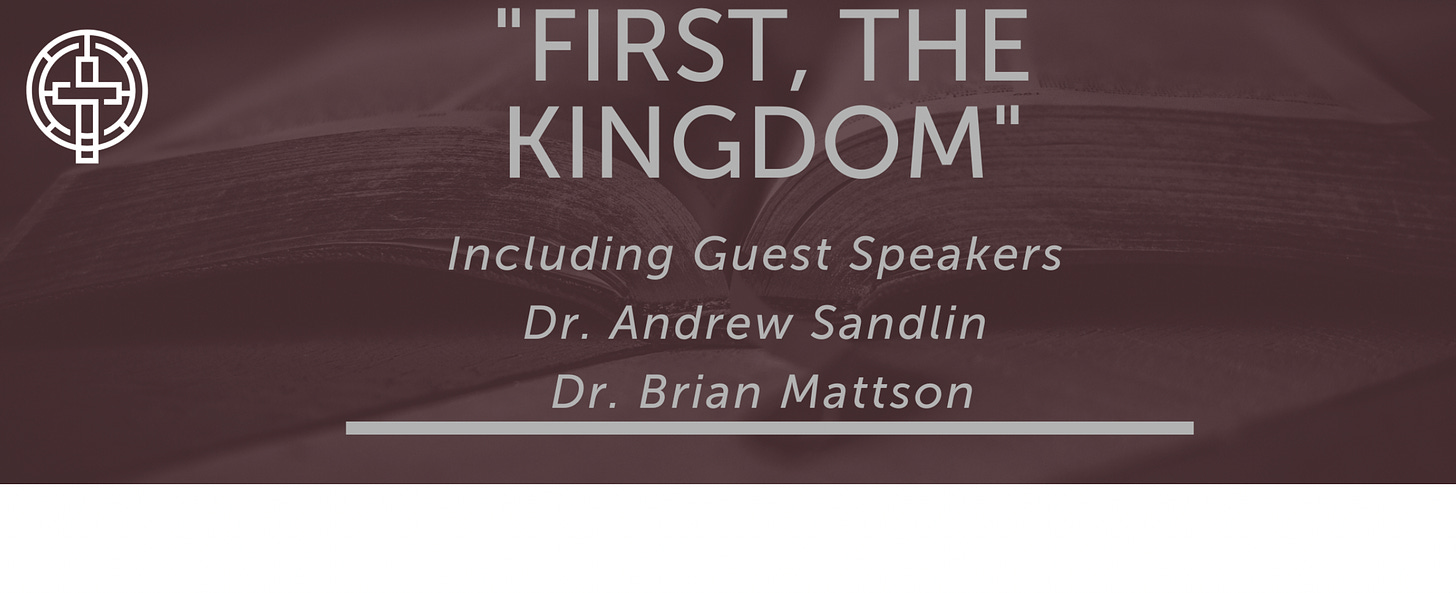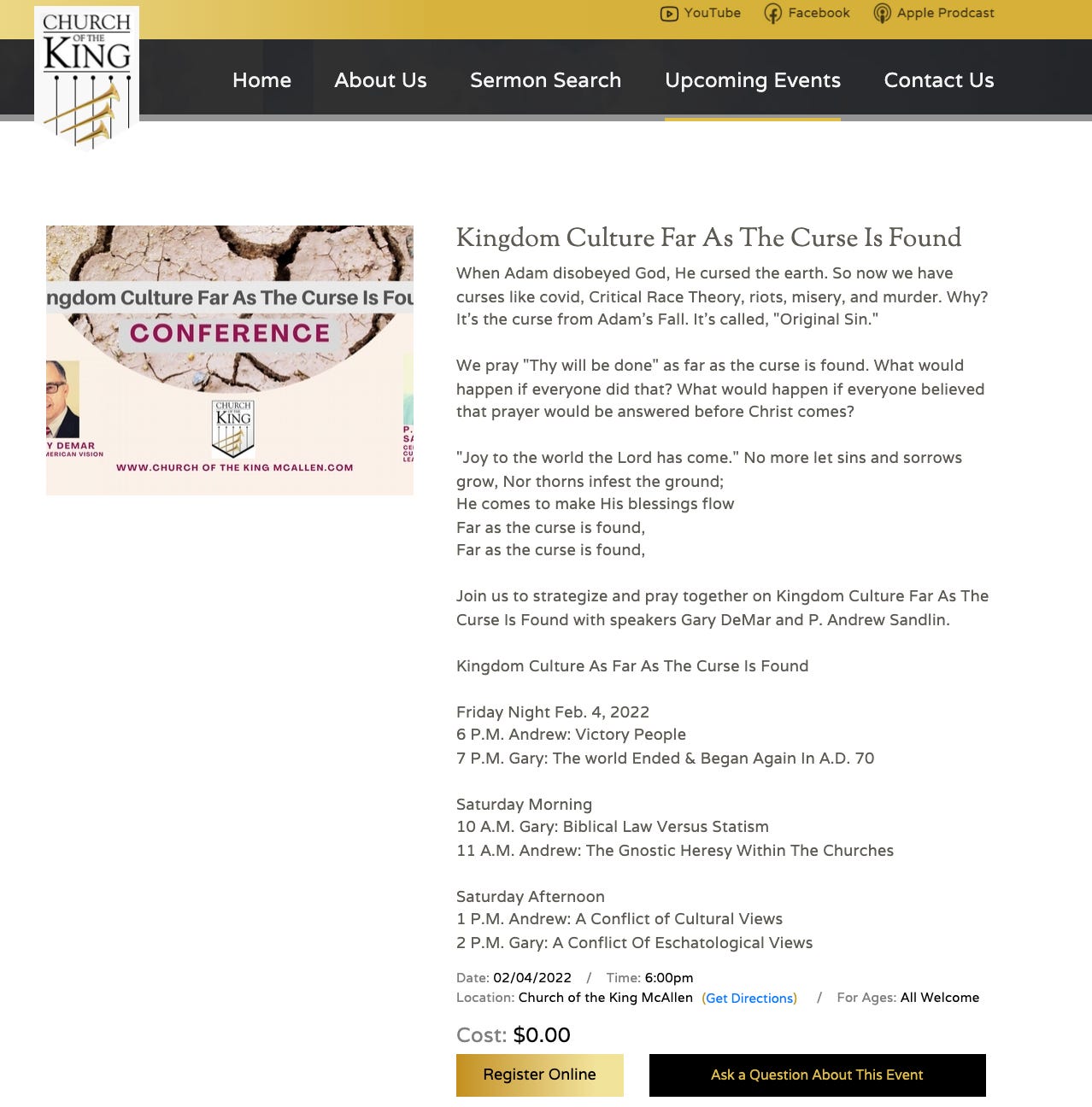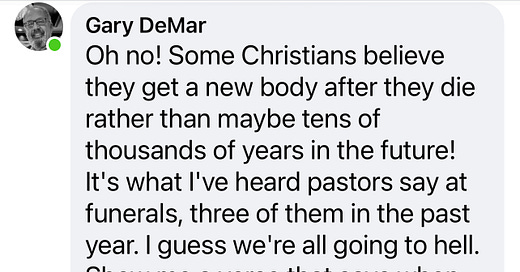
The Kingdom Point of View
No sacrifice is too great for the Kingdom to invade lives, families, and churches, as well as business, education, politics, science, entertainment, music, and economics.
Dear friends and supporters:
Happy New Year. I pray that each of you had the most blessed Christmas ever with your family.
The kingdom of God has been occupying my mind for the last few weeks. Actually, it’s monopolized my mental real estate for the past few decades, and my and CCL’s ministry are marinated in the kingdom. But on Tuesday Sharon and I started driving (what else?) to Texas, in which I’ll be addressing two conferences, both of whose themes is the kingdom of God: the first at City Church-Corpus Christi (Jack Carter, pastor), where my colleague Dr. Brian Mattson will join me, and the weekend afterward at Church of the King-McAllen (Dr. Ron Smith, pastor), where I’ll share speaking with Dr. Gary DeMar of American Vision. (Please note additional conference information far below.)
In this CultureChange e-letter the next several weeks, I suspect I’ll be addressing aspects of the kingdom. Because of the time devoted to traveling and speaking, these newsletters will likely be shorter than usual. But the kingdom of God is always worth discussing.
The famous devotional writer Oswald Chambers once wrote: “ The reason of [for our] discouragement is that we do not brood on God’s point of view.” I’m confident he didn’t mean that we as finite creatures can see things precisely as the infinite God can. Rather, I’m sure he was denoting that Christians must constantly strive to discover what God’s truth is about every particular situation. This is to “brood” on God’s point of view.
To brood on God’s point of view is to brood on the Bible, since that’s where his “viewpoint” is most extensively revealed. When we do, we learn three important truths germane to the kingdom.
God’s Priority
First, the kingdom is God’s priority in the earth. In the NT the kingdom is the translation of basileia. It means the reign of God. The OT Hebrew word for kingdom (malkuth) is basically synonymous. It doesn’t mean a realm, such as land or citizens or an administrative political state. Rather, it denotes the rule itself. In fact, it could easily be translated “reign,” “kingly rule,” or even “sovereignty.”1
God created man and vested him with a commission to exercise dominion over the earth. Man is God’s vice-regent, his ruling deputy. God himself is the earth’s Creator and ruling sovereign. The Bible teaches this in so many places that it’s almost unnecessary to prove it, but try this one:
The LORD reigns, He is clothed with majesty;
The LORD is clothed,
He has girded Himself with strength.
Surely the world is established, so that it cannot be moved.
Your throne is established from of old;
You are from everlasting. (Ps. 93:1–2)
Jesus came declaring the kingdom of God (Matthew 4:17; 23). In fact, Jesus embodied the kingdom (Matthew 12:25–29). When Peter preached his memorable post-resurrection Pentecostal sermon (Acts 2), he trumpeted that the risen Lord had ascended to the heavens to assume David’s throne to rule the earth (vv. 22–36). Paul indicates in 1 Corinthians 15 that after Christ ascended, he formally launched his cosmic redemptive rule, and this rule will continue until he has placed all enemies under his feet (vv. 15–28). That’s when the end, the eternal Kingdom, finally arrives.
Liberals, Conservatives, and Kingdom
If liberals make the grand mistake of equating the Kingdom of God with humanistic social betterment programs like “social justice,” Black Lives Matter, CRT, and Build Back Better, orthodox Christians tend to identify the kingdom almost exclusively with Israel’s old covenant Kingdom and/or the eternal Kingdom when human history has ended. Alternatively, some believe that Christ will return to earth to establish a 1000-year reign (millennium) on the earth itself.
Few of them acknowledge the Kingdom as a present reality or, if they do, don’t identify it as palpable and pinchable, the reign of God in all areas of life designed to overwhelm the earth as a result of Christ’s death and resurrection.
The kingdom of God is everywhere but here.
No Kingdom-in-Absentia
But the Bible itself won’t sustain this kingdom-in-absentia viewpoint. Jehovah reigns universally. He sent his Son to mediate his Kingdom in time and history. And while the kingdom won’t come in all its comprehensive perfection until the consummation in eternity (1 Corinthians 15:50–58), the reality of that kingdom rule is an inextricable part of the present world order.
This doesn’t mean we can simply identify the Kingdom with any human institution, including the family and church, and particularly not the state. But it does mean that any individual or institution that reflects divine truth revealed in God’s word and his Son to that extent exhibits God’s Kingdom.
Kingdom and Gospel
This is where the gospel comes in. We might think that it’s the gospel, not the Kingdom, that’s God’s present priority. This answer isn’t quite wrong, but it’s not particularly right, either. The gospel is the redemptive message of the Kingdom in the fallen world. This is why Jesus came preaching the gospel of the Kingdom. The gospel is the good news, and the good news is that God in Christ is vanquishing the forces of evil (see “Gospel or Salvation?”). This is just what Christ did when he died on the cross and rose from the dead (Colossians 2:11–15). The gospel is the central Kingdom message adapted to the post-Fall world, but the gospel is not identical to the Kingdom itself.2
(continued below)
The Christian life is a battle, and battles presuppose enemies. The chief enemy of Christians is Satan (and demonic spirits aligned with him [Eph. 6:12]), but a leading strategy in thwarting God’s earthly kingdom is his enlisting humans to assist him. This diabolical strategy started in Eden.
The Bible assumes that the true Faith will constantly be under attack in the sinful world and in the church. This doesn’t mean that we should invent enemies when there are none. There are enemies aplenty already.
Get the e-book here.
(continued)
Two-Kingdom Theology, the Biblical One
Second, the course of history since Genesis 3 is the clash of two kingdoms. We hear a lot about “Two-kingdom theology” in some quarters, and the Bible certainly does teach the existence two kingdoms, but not the kingdoms sometimes supposed (i.e., Christ’s redemptive Kingdom in the church and the natural-law kingdom everywhere else). The two actual kingdoms the Bible reveals are the kingdoms of Christ and of Satan.
When Satan tempted the desiccated Lord in the desert (Matthew 4:8–10), the former told the Son of God he’d grant him all of the kingdoms of the world if he would fall down and worship him. Of course, the kingdoms all ultimately belong to the King, but Satan is a cosmic insurrectionist and wields control over earthly kingdoms to the extent that their human lords invite him. Lucifer was expelled from heaven and renamed Satan precisely because he coveted Jehovah‘s kingly rule (Isaiah 14).
The Great Satanic Objective
Since then, his goal has not been fundamentally to send souls to hell, though he certainly is after that objective, but to unseat God himself. He’s destined to fail because of our Lord’s death and resurrection, but he’s scraping to maintain a subordinate, rebellious rule.
Human history is the theater of the contest between these rival kingdoms, and these competing kings. In the words of theologian Herman Bavinck whose article “The Kingdom of God, the Highest Good” to which Brian Mattson alerted me recently, Christ and Satan are “Kingdom heads and crown-wearers.”
This means Kingdom Christians must stand for childbearing and against abortion; for creational sexuality and against the LGBTQ agenda; for the rule of law and against “social justice”; for economic liberty and against state socialism; for the family and against feminism; for colorblindness and against wokeness; for compassionate wealth and against materialist consumerism; for an independent judiciary and against politicized courts; and much more.
An old spiritual is titled, paraphrasing our Lord, “Satan Your Kingdom Must Come Down.” And it will come down because of our Lord’s redemptive reign. Until then, we battle under the authority of King Jesus the rival king Satan in our own lives and families and churches and culture, including in the state.
Kingdom Sacrifice
Third, no sacrifice is too great for the kingdom. On Sunday, January 23 I’ll be speaking at City church-Corpus Christi on “Captivated by the Kingdom.” My text will be Matthew 13:44–46, in which Jesus parabolically teaches:
“Again, the kingdom of heaven is like treasure hidden in a field, which a man found and hid; and for joy over it he goes and sells all that he has and buys that field.
“Again, the kingdom of heaven is like a merchant seeking beautiful pearls, who, when he had found one pearl of great price, went and sold all that he had and bought it.”
These brief parables vary in detail but teach the same lesson: the Kingdom of God is so valuable that it’s worth sacrificing all we have for it. Since the Kingdom is the reign of God in Christ Jesus, sacrificing for that reign in the earth demands sacrificing our time and reputation and money and friendships and even, if necessary, our life. The Kingdom is worth it.
Just here an important point confronts us. We might assume it’s the Lord himself for whom we’re sacrificing, and his Kingdom is merely derivative. And there’s no doubt that God is greater than his Kingdom.
God Is Never Without His Kingdom
But because we’re creatures in history, embodied image-bearers, we never encounter God apart from his kingdom. To love and sacrifice for God is to love and sacrifice for his Kingdom.This means that we must not be committed merely to a private, devout relationship to the Lord, in prayer and Bible reading, foundational though they are. We must not, in the words of Stephen Perks, turn the Christian faith into a “private devotional hobby.”
Instead, we must sacrifice for the Kingdom of God to be reflected on our own lives, families, and churches, as well as in businesses, education, politics, science, entertainment, music, and economics. Christ’s kingdom knows no bounds. We cannot say: “Reign here and no further.” To sacrifice for the kingdom is to sacrifice for the Lord‘s reign everywhere under all conditions.
This, in fact, will occur one day:
Therefore God also has highly exalted Him and given Him the name which is above every name, that at the name of Jesus every knee should bow, of those in heaven, and of those on earth, and of those under the earth, and that every tongue should confess that Jesus Christ is Lord, to the glory of God the Father. (Philippians 2:9–11)
Conclusion
Resolve, therefore, in 2022 to adopt, nourish, and implement this Kingdom point of view. If you’re a parent, inculcate it in your children. If you’re a pastor, instill it in your congregation. If you’re a mentor, convey it to your protégé.
To sacrifice all that we have for the Kingdom is to “brood” on — and perpetuate — God’s point of view.
Will you consider a tax-deductible donation to CCL via PayPal or Venmo? Or mail a check to CCL, Box 100, Coulterville, CA 95311. God uses you to keep us going — and expanding.
Personal
Sharon and I are in west Texas, one of our favorite places. We relish Alpine, Marfa, and Marathon, far west of what’s considered west Texas, like San Antonio and even Odessa-Midland. There’s not much out here but wild, lonely mountains, deserts, and vast blue sky. We wouldn’t have it any other way.
We enjoyed New Year’s with our lovely daughter Peace, devout Christian, faithful friend, and deputy sheriff (peace officer!).
I hope to write on another aspect of the Kingdom next week, and I’ll see a number of you in south Texas
For the King and His Kingdom,
Founder & President, Center for Cultural Leadership
More information here.
More information here.
More great stuff:
The Center for Cultural Leadership site is here.
My Amazon author page (print and digital) is here.
You can find my sermons and lectures at my YouTube channel.
Sign up to get my blog updates here.
Here’s my Twitter feed.
If you want to get the free exclusive hard copy publication Christian Culture, please send me a Facebook private message.
The CCL phone number is 831-420-7230.
The mailing address is:
Center for Cultural Leadership
P. O. Box 100
Coulterville, CA 95311
A. M. Hunter, The Unity of the New Testament (London: SCM Press, 1943), 48.
N. T. Wright, What St. Paul Really Said (Grand Rapids: Eerdmans, 1997), 39–62.













